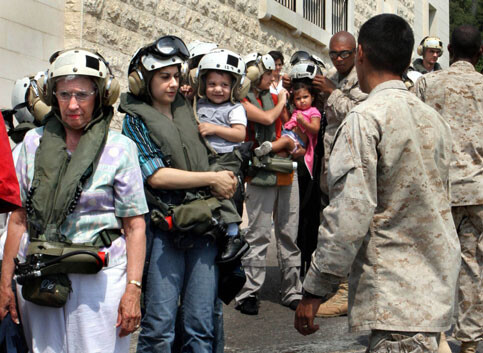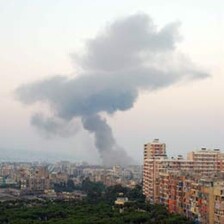Beirut 22 July 2006

Around 1,000 Americans, visibly relieved to have escaped the relentless aerial bombing, disembarked overnight in the port of Larnaca from USS Nashville after being rescued by U.S. Marines, 19 July 2006. (IRIN)
We woke up this morning to a crowded sea. From our Beirut balcony, we could see a steady parade of warships, ferries, cruise ships, helicopter ships, and one aircraft carrier. Helicopters ferried evacuees to the aircraft carrier, and it eventually disappeared to the west. Back and forth, all day, the ships steamed between Beirut and Cyprus. There had been many complaints about the efficiency of the evacuation, but it seems that sufficient resources and will is finally producing results. Tens of thousands are relieved to be getting out.
The use of the term “refugee” caused controversy when it was applied to those driven from their homes by Hurricane Katrina last September, but, in the current war, only the lucky get to be refugees. Unlike the Katrina victims, they actually do cross an international border; they also must pass through a military blockade. About 1,500 Lebanese lined up yesterday to renew their passports or obtain new ones so that they could leave Lebanon; the scene at the General Security headquarters in Beirut was ugly. As citizens of a country under attack by Israeli forces, they will hardly be able to pierce the naval blockade, so their only option is a land route to Syria.
Most Lebanese are not lucky enough to be refugees. They will have to cope with living in a war zone. About 500,000 are even less likely — they have been driven from their homes in southern Lebanon and Beirut’s southern suburbs, a Katrina-like catastrophe in a country without the resources of the United States, during an ongoing war and blockade.
Domestic workers from developing countries also face a situation very different from that of North American and European citizens. These are mostly unmarried women from Sri Lanka, the Philippines, Ghana, and other countries. Leaving Lebanon for the Philippines, for example, means finding yourself back where you started without a job and facing a very expensive return trip in order work again. Hence the Daily Star reported today that only 1,000 of the 30,000 Filipinos have requested to leave Lebanon, and only 5,000 of the 90,000 Sri Lankans. Moreover, some who wish to leave cannot because their sponsors themselves have fled and left them without papers.
The western media has been focused like a laser on the dramatic story of the evacuation of refugees from western countries. The Americans I know who are on their way out all have the same question: Why are we the story? With hundreds dead, thousands injured, hundreds of thousands displaced, Lebanon essentially turned into a Gaza with mountains, and the Bush Administration saying that talk of a cease-fire is “premature,” can we ever expect the western media to report what is significant rather than what will entertain its audience?
Related Links
Patrick McGreevy heads up the American Studies Program at the American University of Beirut





